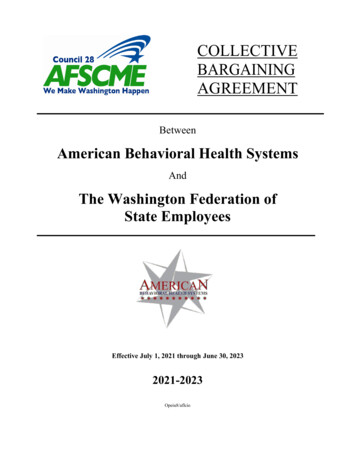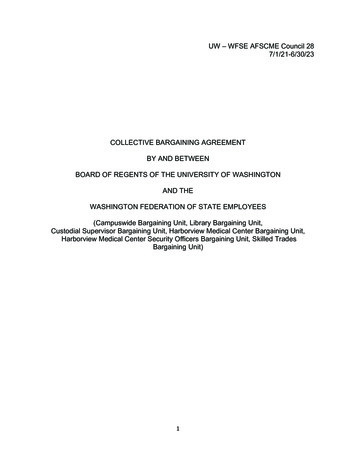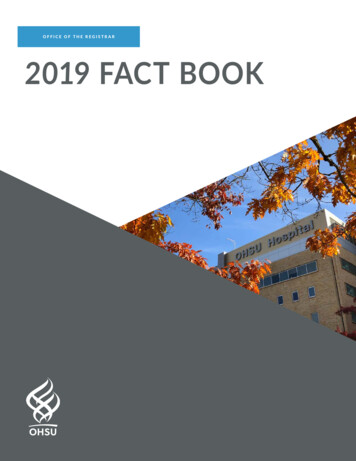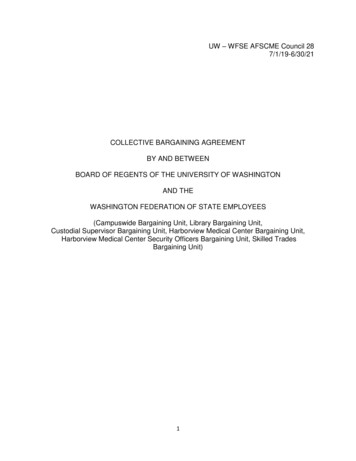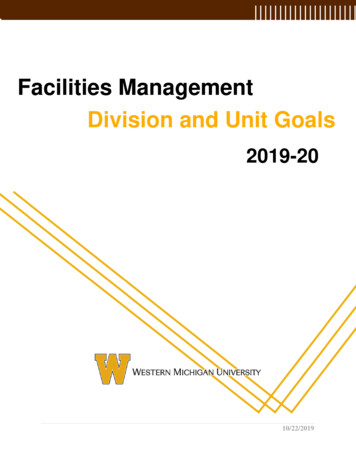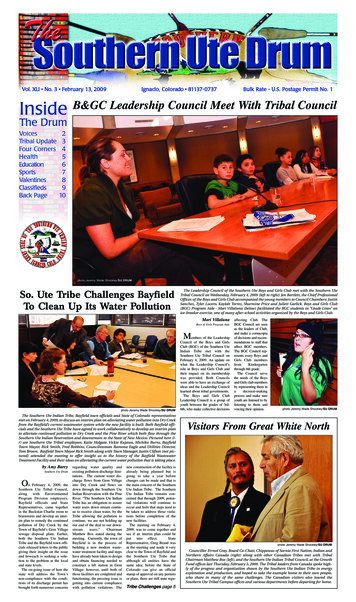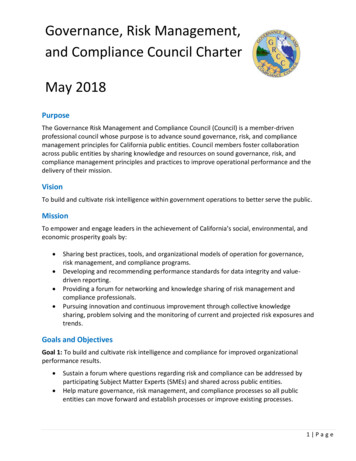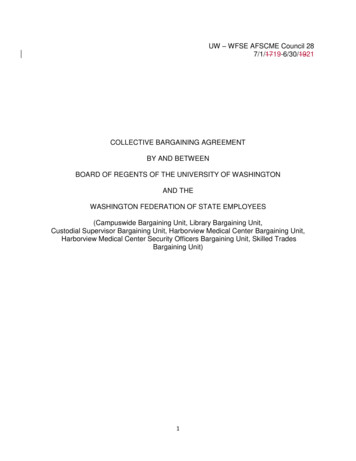
Transcription
UW – WFSE AFSCME Council 287/1/1719-6/30/1921COLLECTIVE BARGAINING AGREEMENTBY AND BETWEENBOARD OF REGENTS OF THE UNIVERSITY OF WASHINGTONAND THEWASHINGTON FEDERATION OF STATE EMPLOYEES(Campuswide Bargaining Unit, Library Bargaining Unit,Custodial Supervisor Bargaining Unit, Harborview Medical Center Bargaining Unit,Harborview Medical Center Security Officers Bargaining Unit, Skilled TradesBargaining Unit)1
TABLE OF CONTENTSPREAMBLE . 6ARTICLE 1 – UNION RECOGNITION . 6ARTICLE 2 – NON-DISCRIMINATION . 6ARTICLE 3 – REASONABLE ACCOMMODATION OF EMPLOYEES WITH DISABILITIES . 7ARTICLE 4 – WORKPLACE BEHAVIOR . 9ARTICLE 5 – AFFIRMATIVE ACTION . 10ARTICLE 6 – GRIEVANCE PROCEDURE. 10ARTICLE 7 – EMPLOYEE RIGHTS . 15ARTICLE 8 – EMPLOYEE FACILITIES . 16ARTICLE 9 – HOURS OF WORK AND WORK SCHEDULES . 18ARTICLE 10 – OVERTIME . 21ARTICLE 11 – TRAINING AND PROFESSIONAL DEVELOPMENT. 22ARTICLE 12 – LICENSURE AND CERTIFICATION . 23ARTICLE 13 – TUITION EXEMPTION PROGRAM . 23ARTICLE 14 – HIRING, APPOINTMENTS, PROMOTIONS, AND TRANSFERS . 24ARTICLE 15 – INTER-SYSTEM MOVEMENT . 30ARTICLE 16 – HOLIDAYS . 30ARTICLE 17 – VACATIONS . 32ARTICLE 18 – SICK LEAVE . 35ARTICLE 19 – VOLUNTARY EMPLOYEE BENEFICIARY ASSOCIATIONS . 37ARTICLE 20 – MISCELLANEOUS LEAVE. 37ARTICLE 21 – FEDERAL FAMILY MEDICAL LEAVE ACT AND PARENTAL LEAVE . 39ARTICLE 22 – CHILD/DEPENDENT CARE . 40ARTICLE 23 – SHARED LEAVE . 41ARTICLE 24 – UNPAID HOLIDAYS FOR A REASON OF FAITH OR CONSCIENCE. 42ARTICLE 25 – LEAVE DUE TO FAMILY CARE EMERGENCIES . 42ARTICLE 26 – CIVIL/JURY DUTY LEAVE AND BEREAVEMENT LEAVE . 43ARTICLE 27 – LEAVE RELATED TO DOMESTIC VIOLENCE, SEXUAL ASSAULT OR STALKING . 44ARTICLE 28 – INCLEMENT WEATHER AND SUSPENDED OPERATIONS . 44ARTICLE 29 – MILITARY LEAVE . 45ARTICLE 30 – WORK RELATED INJURY LEAVE . 46ARTICLE 31 – HEALTH AND SAFETY . 472
ARTICLE 32 – UNIFORMS AND SPECIAL CLOTHING . 50ARTICLE 33 – TRANSPORTATION AND COMMUTE TRIP REDUCTION . 51ARTICLE 34 – PERFORMANCE EVALUATION . 52ARTICLE 35 – PERSONNEL FILES . 54ARTICLE 36 – CORRECTIVE ACTION/DISMISSAL . 55ARTICLE 37 – EMPLOYEE ASSISTANCE PROGRAM . 57ARTICLE 38 – SENIORITY, LAYOFF, REHIRE . 57ARTICLE 39 – RESIGNATION AND ABANDONMENT . 62ARTICLE 40 – MANDATORY SUBJECTS . 63ARTICLE 41 – NEW EMPLOYEES . 65ARTICLE 42 – UNION ACTIVITIES, RIGHTS, AND STEWARDS . 65ARTICLE 43 – JOINT UNION/MANAGEMENT COMMITTEES . 69ARTICLE 44 – CLASSIFICATIONS AND RECLASSIFICATION . 71ARTICLE 45 – COMPENSATION, WAGES AND OTHER PAY PROVISIONS . 74ARTICLE 46 – HEALTH CARE BENEFITS AMOUNTS . 81ARTICLE 47 – CONTRACTING. 83ARTICLE 48 – STAFFING CONCERNS . 84ARTICLE 49 – PRIVACY . 84ARTICLE 50 – NO STRIKE/LOCKOUT . 84ARTICLE 51 – BOARD OF REGENTS . 85ARTICLE 52 – TRADES APPRENTICESHIP PROGRAM . 85ARTICLE 53 – WASHINGTON FAMILY MEDICAL LEAVE PROGRAM . 86ARTICLE 54 – SUBORDINATION OF AGREEMENT AND SAVING CLAUSE . 86ARTICLE 55 – CONTRACT PUBLICATION . 86ARTICLE 56 – UNION MEMBERSHIP DUES DEDUCTION, AND STATUS REPORTS . 87ARTICLE 57 – MANAGEMENT RIGHTS AND RESPONSIBILITIES. 91ARTICLE 58 – TERM OF AGREEMENT . 91ARTICLE 59 – DRUG TESTING . 91ARTICLE 60 – REPRESENTED REGULAR TEMPORARY EMPLOYEES . 92APPENDIX I – JOB CLASSIFICATIONS . 95APPENDIX II – DIFFERENTIALS . 102APPENDIX III – OVERTIME EXEMPT JOB CLASSIFICATIONS . 105APPENDIX IV – LAYOFF SENIORITY UNITS . 106APPENDIX V – PAY TABLES. 108PAY TABLE B0 . 1083
PAY TABLE BABB . 112PAY TABLE BI . 118PAY TABLE BL . 121PAY TABLE BM. 128PAY TABLE BV . 129APPENDIX VI – CONTRACTING OUT FORM . 134MOU – ADEQUATE LUNCH SPACE . 136MOU – EVS CUSTODIANS WORK SCHEDULE AND PREMIUM AT UWMC . 137MOU – HOSPITAL ASSISTANT SERIES AND PATIENT CARE TECHNICIAN RECRUITMENT ANDRETENTION WAGE INCREASES . 138MOU – HOSPITAL CENTRAL SERVICES TECHNICIANS . 167MOU – HOUSE BILL 2669. 169MOU – INFECTION CONTROL PREMIUM-CONSOLIDATED LAUNDRY . 170MOU – KING COUNTY PREMIUM PAY . 171MOU – LEAVE OF ABSENCE WFSE PRESIDENT . 174MOU – LEGISLATIVE APPROVAL AND FUNDING . 175MOU – LIBRARY SERIES RECRUITMENT AND RETENTION WAGE INCREASES . 176MOU – LUMP SUM PAYMENT . 177MOU – MENTAL HEALTH PRACTITIONERS RECRUITMENT AND RETENTION WAGE INCREASES. 178MOU – PAY TABLE BK . 179MOU – PAY TABLE PARITY . 180MOU – PUBLIC RECORDS REQUESTS AND PRIVACY . 188MOU – SALARY OVERPAYMENT RECOVERY. 189MOU – SCHOLARSHIP FUND FOR MEDICAL CENTER EMPLOYEES . 195MOU – SKILLED TRADES JOB CLASSIFICATIONS RECRUITMENT AND RETENTION WAGEINCREASES . 196MOU – SURGICAL TECHNOLOGIST RECRUITMENT AND RETENTION WAGE INCREASES . 197MOU – SURGICAL TECHNOLOGISTS . 198MOU –TRUCK DRIVER SERIES RECRUITMENT AND RETENTION INCREASES . 199MOU – VACATION TIME OFF CALENDAR . 200SIDE LETTER A – CITY OF SEATTLE MINIMUM WAGE . 201SIDE LETTER B – DIVERSITY AND INCLUSION . 202SIDE LETTER C – HMC EVS UNIFORMS. 203SIDE LETTER D – PUBLIC TRANSPORTATION DELAYS . 204SIDE LETTER E – SEATTLE CAMPUS CUSTODIAN PARKING . 2054
SIDE LETTER F – TRACKING DISCRIMINATION AND BIAS . 206SIDE LETTER G – U-PASS . 207SIDE LETTER H – UW SEATTLE CAMPUS BUILDING SERVICES ALTERNATIVE WORK SCHEDULES. 208SIDE LETTER I – WORKDAY ROSTERS . 209SIGNATORIES . 2125
PREAMBLEPursuant to provisions of RCW 41.80 and in order to establish harmonious employmentrelations through mutual cooperation, to promote the mission of the University, torecognize the value of employees and the necessary work they perform, to determinewages, hours, and other terms and conditions of employment, and to provide methodsfor the prompt and equitable resolution of disputes, the parties enter into this Agreement.This Agreement is made and entered into by and between the Board of Regents of theUniversity of Washington, hereinafter referred to as the Employer, and the WashingtonFederation of State Employees, AFSCME Council 28, AFL-CIO hereinafter referred to asthe Union.ARTICLE 1 – UNION RECOGNITION1.1The Employer recognizes the Union as the sole and exclusive bargainingrepresentative in all matters establishing and pertaining to wages and salaries,hours, and working conditions for all employees of the University of Washington inbargaining units certified by the Washington Personnel Resources Board, thePublic Employment Relations Commission and/or the Department of Labor andIndustries under the jurisdiction of RCW 28B.16 and 41.80. The composition ofthese units is as set forth in Appendix I of this Agreement – Bargaining UnitsRepresented by the Washington Federation of State Employees.1.2The Employer recognizes the exclusivity of the Union as bargaining representativefor employees in the bargaining unit. The Employer agrees not to enter into anyagreement or contract with bargaining unit employees, individually or collectively,which conflicts with the terms of this Agreement unless the employee(s), Unionand Employer specifically agree to such Agreement.ARTICLE 2 – NON-DISCRIMINATION2.1The parties individually agree that they will not engage in any act or practice orpursue any policy which is discriminatory against any employee who may be aqualified disabled individual, has status as a protected veteran (disabled veteran,recently separated veteran, active duty wartime or campaign badge veteran, orArmed Forces service medal veteran), , who is a victim of domestic violence,sexual assault or stalking, nor because of their military status, or because of age,sex (except where sex or age is a bona fide occupational qualification), sexualorientation, gender identity or expression, genetic information, pregnancy, politicalaffiliation, political belief, marital status, race, national origin, color, creed, religion,or membership or non-membership in a union. Unlawful harassment is includedas a form of prohibited discrimination.2.2Sexual Harassment. No employee shall be subjected to discrimination in the formof sexual harassment, currently defined in the University of Washington Policy6
Directory as the use of one’s authority or power, either explicitly or implicitly, tocoerce another into unwanted sexual relations or to punish another for his or herrefusal, or as the creation by a member of the University community of anintimidating, hostile, or offensive working or educational environment, throughverbal or physical conduct of a sexual nature. as defined in University ofWashington Executive Order 31 on Nondiscrimination and Affirmative Action.2.3Complaints:Employees who feel they have been the subject of discrimination, harassment, orretaliation are encouraged to discuss such issues with their supervisor,administrator, or Human Resource Consultant for local resolution. The goal oflocal resolution is to address and resolve problems as quickly as possible and tostop any inappropriate behavior for which a University employee is responsible.A formal complaint may be filed with the University Complaint Investigation andResolution Office (UCIRO). Employees may also file discrimination, harassmentor retaliation complaints with appropriate federal or state agencies or through thegrievance process in accordance with Article 6 of this Agreement. In cases wherean employee files both a grievance and an internal complaint regarding the allegeddiscrimination, harassment or retaliation the grievance will be suspended until theinternal complaint process has been completed.In accordance with Executive Order 31, retaliation against any individual whoreports concerns regarding discrimination or harassment, or who cooperates withor participates in any investigation of allegations of discrimination, harassment, orretaliation is prohibited.2.4The parties also agree that they will not engage in any act or practice or pursueany policy which is discriminatory against any employee based on politicalaffiliation, political belief or because of the participation or lack of participation inunion activities.2.5Both parties agree that nothing in this Agreement will prevent the implementationof an approved affirmative action plan.2.6A grievance alleging a violation of this article must be submitted within 180 daysof an alleged occurrence.2.7When a grievance or complaint is filed, the University will implement interimmeasures as appropriate.ARTICLE 3 – REASONABLE ACCOMMODATION OF EMPLOYEES WITHDISABILITIES3.1Disability Accomodation. The Employer and Union will comply with all relevantfederal and state laws, regulations and executive orders and with the provisions ofthe Employer’s policy in providing reasonable accommodationsUniversity of7
Washington Administrative Policy Statement 46.5 on Reasonable Accommodationof Employees With Disabilities. The University and the Union are committed toproviding reasonable accommodation to employees with disabilities.3.2An employee who believes that he or shethey suffers a disability and requires areasonable accommodation to perform the essential functions of his or hertheirposition may request such an accommodation through the by filling out theDisability Accommodation Services Office Request form or otherwise informing theemployee’s supervisor and/or department of the need for accommodation.3.3Employees requesting accommodation must cooperate with the University indiscussing the need for and possible form of any accommodation. The Employermay require supporting medical documentation and may require the employee toobtain a second medical opinion at Employer expense. Medical informationdisclosed to the Employer will be kept confidential.3.4The Employer will determine whether an employee is eligible for a reasonableaccommodation and the final form of any accommodation to be provided. TheEmployer will attempt to find opportunities for modified duty that can be offered toemployees in lieu of and/or after disability leave. If requests for modified duty aredenied, the Employer, upon request, will provide the modified duty options thatwere considered and reason(s) for denial electronically or in writing.3.5An employee who is unable to perform the essential function of his/hertheir positiondue to disability may be separated from service after the Employer has made goodfaith efforts to reasonably accommodate the employee’s disability in accordancewith applicable state and federal law. Disability separation is not a correctiveaction.3.6Disability Leave. Disability leave may be a combination of the employee’s accruedsick leavetime off, vacation leavetime off, personal holiday, compensatory time,and/or leave without payunpaid time off, the combination of which may bedetermined by the employee. If disability leave is taken as an leave withoutpayunpaid absence, the employee may apply eight (8) hours of accrued paid leavetime off per month during at least the first four (4) months of disability leave toprovide for continuation of employer paid health benefits. The interspersed paidleave time off will be applied to the first working day of the month. Periods ofdisability leave covered by the FMLA shall be deducted from the four (4) monthperiod of eligibility to intersperse paid leave.3.7Pregnancy Accommodation. The Employer and the Union will comply with allrelevant federal and state laws, regulations, and executive orders and with theprovisions of Washington Administrative Policy Statement 46.7 ReasonableAccommodation of Pregnant Employees. The University and the Union arecommitted to providing reasonable accommodation to pregnant employees.8
A. The following pregnancy-related accommodations shall not require health careprovider certification and are not subject to an employer's claim of unduehardship:1. Providing more frequent, longer, or flexible restroom breaks;2. Modifying a no food or drink policy;3. Providing seating or allowing the employee to sit more frequently if theirjob requires then to stand; and1.4. Restricting lifting to 17 lbs. or less.B. An employee's pregnancy or pregnancy-related health condition may also beaccommodated as follows:1. Job restructuring, part-time or modified work schedules, reassignment to avacant position, or acquiring or modifying equipment, devices, or anemployee's work station;2. Providing for a temporary transfer to a less strenuous or less hazardousposition;3. Providing assistance with manual labor and limits on lifting;4. Scheduling flexibility for prenatal visits; and5. Any further pregnancy accommodation an employee may request.With respect to these accommodations, the University may request an employeeprovide written certification from their treating health care provider regarding theneed for reasonable accommodation and may deny an employee's request forreasons of significant difficulty or expense.ARTICLE 4 – WORKPLACE BEHAVIORThe Employer and the Union agree that all employees should work in anenvironment that fosters mutual respect and professionalism. The parties agreethat inappropriate behavior in the workplace does not promote the University’sbusiness, employee well being, or productivity. All employees are responsible forcontributing to such an environment and are expected to treat others with courtesyand respect.Inappropriate workplace behavior by employees, supervisors and/or managers willnot be tolerated. At no time will bullying be accepted as appropriate workplacebehavior. Bullying is defined as language or conduct that is unwelcome andsufficiently severe, persistent, or pervasive such that it could reasonably beexpected to create an intimidating, hostile, or offensive environment, or has thepurpose or effect of unreasonably interfering with an employee's workperformance, when viewed through both an objective and subjective standard. Ifan employee and/or the employee’s union representative believes the employeehas been subjected to inappropriate workplace behavior, the employee and/or theemployee’s representative is encouraged to report this behavior to the employee’ssupervisor, a manager in the employee’s chain of command and/or the HumanResources Office. An employee or the employee’s representative should identify9
complaints as inappropriate workplace behavior. The Employer will investigate thereported behavior and take appropriate action as necessary. The employee and/orunion representative will be notified upon conclusion of the investigation.Retaliation against employees who make a workplace behavior complaint will notbe tolerated.Grievances may be filed up to Step 3 Mediation.ARTICLE 5 – AFFIRMATIVE ACTION5.1Policies. In conjunction with Federal and State Executive Orders, the Employerand the Union agree on the need for an affirmative action approach to correct andreview any inequities in the employment process. The Employer shall have andimplement an affirmative action plan which requires the Employer to make specialefforts to recruit, employ, retain, train, promote, encourage career development,and transfer qualified members of groups formerly excluded, even if that exclusioncannot be traced to particular discriminatory actions on the part of the Employer,and to develop, implement, and monitor affirmative action goals and timetables forhiring and/or promoting members of protected groups into job classes/categorieswhere it has been determined that under-utilization exists.5.2Groups included in the affirmative action program are those covered by federaland state regulations, and are currently women, American Indians, Asian/PacificIslanders, Blacks, Hispanics/Latinos, Vietnam era veterans, disabled veterans,persons with disabilities and persons 40 years of age and older.5.3Goals and Timetables. Upon request the Employer will provide the Union with itsaffirmative action reports which set forth the goals and timetables of the Universityfor bargaining unit employees.5.4It is agreed by the parties that a bargaining unit member elected or selected by theUnion shall be encouraged to take an active interest in affirmative action plansaffecting each bargaining unit covered by this Agreement.ARTICLE 6 – GRIEVANCE PROCEDURE*The Union and the Employer agree that it is in their best interest to resolve disputes atthe earliest opportunity and at the lowest level. Whenever possible, disputes should beresolved informally prior to filing a formal written grievance. To that end, all supervisorsand employees are encouraged to engage in free and open discussions about disputes.6.1Definition. A grievance, within the meaning of this Agreement, shall be defined asany dispute between the University and the Union, an employee, or a group ofemployees as to alleged misapplication or misinterpretation of the terms of this10
Agreement or the Employer’s written personnel rules, policies or practices.6.2Employee Grievance Rights. Any employee who believes he/shethey has havebeen aggrieved may personally seek relief from that condition by filing a grievance,irrespective of any supervisor’s opinion of the grievance’s validity. In thepresentation of grievances, the employees shall be safe from restraint,interference, discrimination, or reprisal.6.3Employee Representation. The Union as exclusive representative of bargainingunit employees is the responsible representative of said employees in grievancematters.6.4Time Limitations.An extension of the time limitations as stipulated in the respective steps below,may be obtained by mutual consent of the parties. Failure of the union to complywith the time limitations without a request of time extension shall constitutewithdrawal of the grievance. Failure of the Employer to comply with the timelimitations without a request for time extension shall move the grievance to thenext step of the grievance procedure. For the purpose of calculating timerequirements, the first day shall be the day following the day on which theemployee was aware, or reasonably should have been aware, of the issue givingrise to the grievance. Saturdays, Sundays, and University holidays shall beincluded in the calculation of days except that the final day may not be on aSaturday, Sunday, or holiday but will end at the close of the first working dayfollowing the Saturday, Sunday, or holiday.6.5Contents. The written grievance shall include the following information:a. The date upon which the grievance occurred.b. The specific Article(s) and Section(s) of the Agreement violated.c. The past practice, rule, policy violated.d. Specific remedy requested.e. The grievant(s) name.f. Name and signature of Union representative (Staff or Steward).g. The nature of the grievance.Failure to include the above information shall not be a reason for invalidating thegrievance.6.6Pay Status – Meetings. Meetings and discussions on the grievance held with theEmployer in connection with this grievance procedure shall normally be held duringthe University’s regular business hours, or as mutually agreeable, and nodeduction in pay status shall be made for the grievant or steward for reasonabletime spent in such meetings or discussions during the employee’s scheduled dutyhours. The work schedule of the grievant will be seriously considered in the11
scheduling of the grievance meetings. Time off for employees and stewards shallbe granted by supervision following a request, but in consideration of jobresponsibilitie
refusal, or as the creation by a member of the University community of an intimidating, hostile, or offensive working or educational environment, through verbal or physical conduct of a sexual nature. as defined in University of Washington Executive Order 31 on Nondiscrimination and Affirmative Action.
